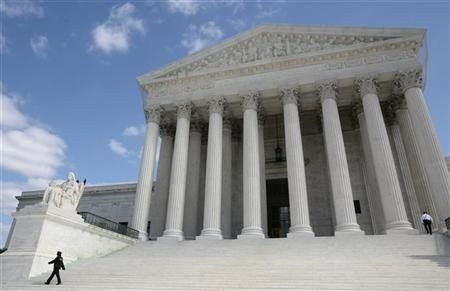Supreme Court Health Care Case: A Primer On Oral Arguments

The nine justices of the U.S. Supreme Court will gather Monday morning to begin three days of oral arguments on the Affordable Care Act, the health insurance overhaul that is the centerpiece of President Barack Obama's domestic agenda.
The case is arguably the most anticipated and politically fraught since Bush v. Gore in 2000, in which the high court decided the presidency.
Oral arguments will pit Solicitor General Donald Verrilli, the administration's Supreme Court lawyer, against a coalition of 26 states represented by Paul Clement, who served as solicitor general under George W. Bush and is now the preferred attorney in high-profile Republican legal battles with the Obama White House.
Here are the issues that will be argued this week in Washington:
Monday, March 26
The justices will hear 90 minutes of argument as to whether they should even consider challenges to the Affordable Care Act in the first place.
The court decided to determine its jurisdiction in the matter due to a 19th-century law prohibiting lawsuits that challenge taxes -- such as the Affordable Care Act's demand, to take effect in 2014, that all Americans get health insurance -- before they are levied.
Both the Obama administration and opponents of the health care law say the tax penalty is just that -- a penalty, not a tax to raise revenues that would be subject to the Tax Anti-Injunction Act of 1867. To argue the other side, the Supreme Court tapped Robert Long, a partner at the Washington law firm Covington & Burling.
Tuesday, March 27
This is the most anticipated hearing in the challenge to the Affordable Care Act. It will address the central question of whether the law's individual mandate -- the insurance-purchase requirement -- is constitutional.
For two hours, the justices will hear from Verrilli, representing the Obama administration; Clement, arguing on behalf of the 26 states whose Republican attorneys general are challenging the health care law; and Michael Carvin of the firm Jones Day, attorney for the National Federation of Independent Business. (The NFIB has sued to have the entire law struck down as unconstitutional because of the cost burden it would impose on employers.)
The question to be answered is whether Congress has the power under the Constitution's Commerce Clause to require Americans to carry health insurance.
Verrilli will tell the court that the individual mandate is well within Congress's authority to regulate interstate commerce, as everyone will have to use health care services at some point in life. Clement and Carvin will counter that the mandate is an unprecedented overreach by the government to force Americans to buy a private product or be penalized.
Wednesday, March 28
The third and final day of oral argument is scheduled to last 2 1/2 hours, with the first 90 minutes devoted to the fate of the health care law if the mandate were to be declared unconstitutional.
The Supreme Court has brought in H. Bartow Farr III, a veteran Washington lawyer in private practice, to argue that the Affordable Care Act could remain intact even without the individual mandate.
The Obama administration maintains that popular provisions such as the ban on denying coverage to people with pre-existing medical conditions cannot stand without the mandate. Though arguing for the other side, Clement similarly will argue that the entire law must be scrapped if the mandate is thrown out. While many federal statutes contain clauses allowing for severability -- allowing nullification of part of a law without sacrificing it altogether -- the Affordable Care Act has no such provision.
Finally, one hour will be spent addressing the 2010 law's expansion of Medicaid eligibility that states eventually will be responsible for covering.
© Copyright IBTimes 2024. All rights reserved.





















